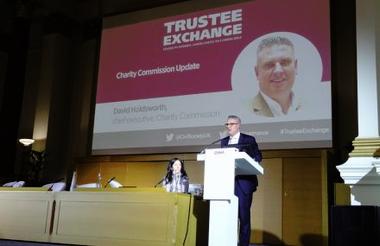The Charity Commission’s chief executive has told an event that voluntary trusteeship has proven to be “no barrier to diversity” and that it must be protected as “the linchpin of public trust in charity”.
David Holdsworth’s speech at yesterday’s Trustee Exchange conference, organised by Civil Society, followed a panel discussion in which some called for trustee payments to attract more diverse board members.
Referring to the debate, Holdsworth said: “While we heard some cogent arguments in favour of paying trustees at the panel today, to my mind, none can truly stand up to what is actually at stake here.
“Which is why I want to be very clear it’s the commission’s belief, and my personal belief, that voluntary trusteeship underpins the public’s trust in charity.
“And public trust is particularly important when we consider the fact that charities in England and Wales rely on £60bn a year in donations from the British public.”
Holdsworth’s comments came after the commission last week published revised guidance for charities on paying trustees.
Panel discussion
Mita Desai, co-chief executive of the Young Trustees Movement and chair of Community Action Redbridge, told the panel that the current system of trusteeship is not working to enable the diversity of thoughts and representation on boards.
Burnout for people on the sharp end of exclusion on trustee boards is high, Desai said, adding that 23% of young people leave boards because they feel that they don’t belong.
Desai said paying trustees would not affect the passion that people have for the organisations they serve, but not paying trustees, she said, would affect how much trustees can participate.
“If you can’t afford to pay your bills, something has to drop,” she said.
However, former president of NCVO, Baroness Jill Pitkeathley said that paying trustees could damage the public’s perception of charities.
Pitkeathley said: “The general public does have this image of charity, about it being something that can do for the good of others and not for the good of yourself.”
Chief executive of Plan UK Tanya Barron, who is taking on paid and unpaid trustee roles at organisations, expressed concern that if more charities start to pay their trustees, it might narrow the pool of trustees for small organisations that can’t afford to pay.
Meanwhile, Paul Latham, director of communications and policy at the commission, said during the debate that trustees should be unpaid because they are in a position to act on behalf of the wishes of others.
Latham said: “It’s a fiduciary duty and you should generally seek to avoid a conflict between your personal and the trustee role and not to profit from the position you’re in.”
Holdsworth: ‘Voluntary trusteeship is the linchpin of public trust in charity’
The commission’s latest report showed that there was a lack of diversity among trustees, with younger people and those from ethnic minority backgrounds being underrepresented.
However, the commission’s chief executive David Holdsworth said at the event that paying trustees would not broaden the role’s appeal, particularly among currently underrepresented groups.
“Voluntary service has proven to be no barrier to diversity when it comes to trustee recruitment,” he said.
Holdsworth also said that according to the commission’s research on public trust in 2023, most people said they were more inclined to trust charities run by volunteers than those run by paid professionals.
“Put simply, voluntary trusteeship is the linchpin of public trust in charity, and we must guard it fiercely and not look to other solutions unless the evidence points to the other solutions working,” he said.
Holdsworth and Latham both emphasised at the event that expenses do not count as payment to trustees.
They said trustees are entitled to have their expenses, which include childcare, travel costs and meals, reimbursed by their charity.
“In this way, trustees can undertake their voluntary duties without worrying that that it will put them out of pocket,” Holdsworth said.
Related articles












